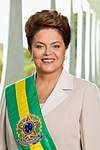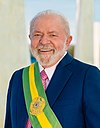You can help expand this article with text translated from the corresponding article in Portuguese. (October 2018) Click for important translation instructions.
|
| Celso Amorim | |
|---|---|
 Amorim in 2010 Amorim in 2010 | |
| Chief Advisor to the President of Brazil for Foreign Policy | |
| Incumbent | |
| Assumed office 5 January 2023 | |
| President | Luiz Inácio Lula da Silva |
| Minister of Defence | |
| In office 5 August 2011 – 31 December 2014 | |
| President | Dilma Rousseff |
| Preceded by | Nelson Jobim |
| Succeeded by | Jaques Wagner |
| Minister of Foreign Affairs | |
| In office 1 January 2003 – 31 December 2010 | |
| President | Luiz Inácio Lula da Silva |
| Preceded by | Celso Lafer |
| Succeeded by | Antonio Patriota |
| In office 20 July 1993 – 31 December 1994 | |
| President | Itamar Franco |
| Preceded by | Fernando Henrique Cardoso |
| Succeeded by | Luiz Felipe Lampreia |
| Ambassador of Brazil to the United Kingdom | |
| In office 16 December 2001 – 27 December 2002 | |
| Nominated by | Fernando Henrique Cardoso |
| Preceded by | Sérgio Amaral |
| Succeeded by | José Bustani |
| Secretary General of Foreign Affairs | |
| In office 23 June 1993 – 1 September 1993 | |
| President | Itamar Franco |
| Preceded by | Luiz Felipe Lampreia |
| Succeeded by | Roberto Abdenur |
| Personal details | |
| Born | Celso Luiz Nunes Amorim (1942-06-03) 3 June 1942 (age 82) Santos, São Paulo, Brazil |
| Political party | Workers' Party (since 2009) |
| Other political affiliations | PMDB (1980–2009) |
| Spouse | Ana Maria Amorim |
| Children | 4 |
| Alma mater | |
| Profession |
|
| Signature |  |
Celso Luiz Nunes Amorim (born 3 June 1942) is a Brazilian diplomat who served as Minister of Foreign Affairs from 20 July 1993 to 31 December 1994 under President Itamar Franco and again from 1 January 2003 to 31 December 2010 under President Luiz Inácio Lula da Silva. He was Minister of Defence from 5 August 2011 to 31 December 2014 under President Dilma Rousseff.
Before his appointment as Minister of Foreign Affairs by Lula, Amorim served as Brazil's ambassador to the United Kingdom. On 7 October 2009, Amorim was named the "world's best foreign minister" by Foreign Policy magazine blogger David Rothkopf. On 5 January 2023, Amorim was appointed as Chief Advisor for Foreign Policy by Luiz Inácio Lula da Silva.
Early life and academic career
Amorim was born in Santos, São Paulo, on June 3, 1942.
He graduated from the Rio Branco Institute, a graduate school of international relations run by the Ministry of External Relations, in 1965, and obtained a post-graduate degree in International Relations from the Diplomatic Academy of Vienna in 1967.
Amorim was a professor of Portuguese language at the Rio Branco Institute, as well as professor of political science and international relations at the University of Brasília. He is a permanent member of the Foreign Affairs Department of the University of São Paulo Institute of Advanced Studies.
Governmental career
Amorim has a long history of government service, beginning in 1987 when he was appointed Secretary for International Affairs for the Ministry of Science and Technology. He served in that position until 1989, when he was selected to be the Director-General for Cultural Affairs in the Ministry of External Relations. Amorim was shifted again in 1990, moving to a new post as Director-General for Economic Affairs. In 1993, he was promoted to the position of Secretary General of the Brazilian foreign-affairs agency.
While serving in the Ministry of External Relations, Amorim spent large amounts of time working as an ambassador to the United Nations. Most notably, he represented Brazil on the Kosovo–Yugoslavia sanctions committee in 1998, and the Security Council panel on Iraq in 1999. Amorim was named as Brazil's permanent ambassador to the United Nations and the WTO later that year, and served for two years before becoming ambassador to the United Kingdom in 2001.
He became Foreign Affairs Minister between January 2003 and December 2010. On 22 July 2005, Amorim was the subject that the 27-year old Brazilian electrician Jean Charles de Menezes was shot dead by police onboard a tube in Stockwell tube station, a day after the failed 21 July 2005 London bombings.
WTO controversy
On July 19, 2008, Amorim stirred up controversy by comparing the descriptions used by wealthier countries to characterize the agricultural concessions they were offering during the Doha Round of WTO talks to the work of Nazi propagandist Joseph Goebbels. This brought a swift condemnation from the U.S. State Department.
Later career
Celso serves on the Commission on Global Security, Justice & Governance, chaired by Madeleine Albright and Ibrahim Gambari. In November 2016, he was appointed by United Nations Secretary-General Ban Ki-moon to the High-Level Panel on Access to Medicines, co-chaired by Ruth Dreifuss, former President of Switzerland, and Festus Mogae, former President of Botswana.
In addition, Celso holds a number of honorary positions, including the following:
- Unitaid, Chair of the Executive Board (since 2017)
- Center for International Relations and Sustainable Development (CIRSD), Member of the Board of Advisors
In 2019, Amorim joined the inaugural meeting of the Puebla Group in Buenos Aires, a conference of left-leaning political leaders.
Personal life
Amorim is married to Ana Maria Amorim and has four children: Vicente, Anita, João, and Pedro.
References
- Brazil will not 'sell' Amazon Archived March 8, 2007, at the Wayback Machine Gulfnews
- Brazil's Defense Minister Is Ousted WSJ. Retrieved on 2011-08-04.
- CV of Celso Amorim on Ministry of External Relations website Archived October 16, 2008, at the Wayback Machine
- David Rothkopf (2009-10-07). "The world’s best foreign minister", Foreign Policy.
- "Ex-chanceler Celso Amorim é nomeado para chefiar assessoria especial de Lula". G1. 5 January 2023.
- Klapper, Bradley S. (2008-07-19). "Brazil official's Nazi reference rocks WTO talks". Newsvine. Associated Press. Retrieved 2009-08-04.
- Secretary-General Appoints Two Former Presidents, 14 Others as Members of High-Level Panel on Access to Medicines United Nations, press release of 19 November 2015.
- Unitaid welcomes Brazil’s Celso Amorim as new Unitaid Chair and the UK’s Sarah Boulton as Vice Chair Unitaid, press release of 23 June 2017.
- Board of Advisors Center for International Relations and Sustainable Development (CIRSD).
- Nicolás Misculin (November 9, 2019), Argentina's Fernandez joins leftist leaders for 'Puebla Group' summit Reuters.
- "Minister of External Relations: Ambassador Celso Amorim". Ministry of External Relations. Archived from the original on 2008-10-16. Retrieved 2008-11-07.
| Political offices | ||
|---|---|---|
| Preceded byFernando Henrique Cardoso | Minister of Foreign Affairs 1993–94; 2003–10 |
Succeeded byLuiz Felipe Lampreia |
| Preceded byCelso Lafer | Succeeded byAntonio Patriota | |
| Preceded byNelson Jobim | Minister of Defence 2011–15 |
Succeeded byJaques Wagner |
| New office | Chief Advisor to the President of Brazil for Foreign Policy 2023–present |
Incumbent |
| Cabinet of Dilma Rousseff (2011–16) | |||||||||||||||||||||||||||||||||||||||
|---|---|---|---|---|---|---|---|---|---|---|---|---|---|---|---|---|---|---|---|---|---|---|---|---|---|---|---|---|---|---|---|---|---|---|---|---|---|---|---|
| |||||||||||||||||||||||||||||||||||||||
- 1942 births
- Living people
- People from Santos, São Paulo
- Ministers of foreign affairs of Brazil
- Ambassadors of Brazil to the United Kingdom
- Permanent Representatives of Brazil to the United Nations
- Permanent representatives of Brazil to the World Trade Organization
- Brazilian columnists
- Recipients of the Great Cross of the National Order of Scientific Merit (Brazil)
- Defence ministers of Brazil
- Diplomatic Academy of Vienna alumni

